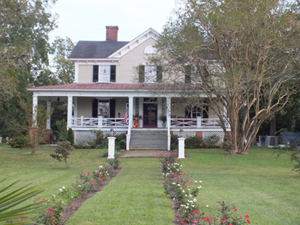Latham House
(Washington County)
Featured Character – 1864 Confederate
Decline

Latham
House
Courtesy of the The Washington County
Historical Society and Shaylee Wright
Born
on March 21, 1811, Charles Latham became
one of the most powerful people in Washington County. A wealthy farmer, the 1860
Census valued his
personal property at over $77,000, Latham owned thirty slaves. In 1854, he organized the
first bank in Plymouth. A devout Unionist and
follower of the Whig
Party, Latham served as county sheriff from 1842 to 1858. Forging a political
alliance between the
county’s planter elite and yeoman farmers, he won election to the state
house
in 1860. However,
as war loomed,
Latham’s political coalition broke apart.
Although he initially supported William Pettigrew as the
county’s
delegate to the secession convention, Latham withdrew his endorsement
after
Pettigrew sided with the secessionists.
Declaring
himself the “poor’s man candidate,” Latham ran against Pettigrew. In February 1861, Latham
trounced Pettigrew,
three-hundred and ninety-two votes to two-hundred and seventy-six. However, voters across North Carolina
decided against holding a
convention, so Latham’s victory meant nothing.
After the bombardment of Fort Sumter,
the state held
another vote on a secession convention.
This time William Pettigrew ran unopposed.
Although Latham’s oldest son joined the
Confederate Army, he gave lukewarm support to the new nation. After the Union occupation
of Plymouth
in 1862, Latham
emerged as a prominent Unionist leader.
However, as guerrilla warfare between the two sides rose
in 1863,
he sought refuge in New York. Although adversely
impacted by emancipation,
the 1870 Census lists his net worth at only $600; he later
served as a
lawyer and politician. Returning
to Plymouth
after the war,
Latham served two terms in the state senate.
His son, Louis Charles Latham later served two terms in
Congress as a
Democrat. Charles
Latham died on May 28,
1893.
According
to local tradition, during the Battle of Plymouth in 1864, citizens of
Plymouth crowded into the basement of the Latham House for protection from
cannon shelling.
